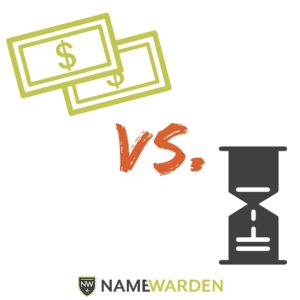Brexit Right… to the Trademark Office, as Applicants Vie for Brexit Trademark Rights
Anytime there’s a catchy new buzzword making headlines, you can bet there will be a slew of trademark filings. More and more, we’ve seen the trend of someone or multiple someones trying to register a trademark for some news item, meme, or new buzzword. Brexit, the term dubbed for Britain leaving the European Union, is no exception. A number of players in the US have filed to register the Brexit trademark, and it’s already registered in its native UK.
Over in the UK, the term has already been registered by Mark Kingsley-Williams, founder and director  of Trademark Direct, a UK trademark services company. But Mark isn’t using it for a cheeky new product, he told Trademark Review that he secured it in order to protect it from others who might try and stifle debate. According to Mark, “I have an interest in politics, and I noticed that the term Brexit was out there and would become widely used as the debate moved forward. I thought the term should be free for anyone to use during the referendum campaign, and so I registered it without the intent of using it for my own commercial ends, but to protect the referendum debate so it couldn’t be stifled by someone else potentially registering the term and having an agenda in their enforcement of it.”
of Trademark Direct, a UK trademark services company. But Mark isn’t using it for a cheeky new product, he told Trademark Review that he secured it in order to protect it from others who might try and stifle debate. According to Mark, “I have an interest in politics, and I noticed that the term Brexit was out there and would become widely used as the debate moved forward. I thought the term should be free for anyone to use during the referendum campaign, and so I registered it without the intent of using it for my own commercial ends, but to protect the referendum debate so it couldn’t be stifled by someone else potentially registering the term and having an agenda in their enforcement of it.”
Well it’s different story here in the U.S. While there is no clearly senior user of Brexit in commerce for their particular goods, several applications have been filed to register a BREXIT trademark. Here’s what we found:
Word Mark: BREXIT
Goods and Services: IC 033. US 047 049. G & S: Hard cider
Mark Drawing Code: (4) STANDARD CHARACTER MARK
Filing Date: June 24, 2016
Current Basis: 1B
Original Filing Basis: 1B
Owner: (APPLICANT) Boston Beer Corporation CORPORATION MASSACHUSETTS 1 Design Center Pl., Ste. 850 Boston MASSACHUSETTS 02210
____________
Word Mark: BREXIT
Goods and Services: IC 005. US 006 018 044 046 051 052. G & S: DIETARY AND NUTRITIONAL SUPPLEMENTS; DIETARY SUPPLEMENTS FOR HUMAN CONSUMPTION; DIETARY AND NUTRITIONAL SUPPLEMENTS FOR HUMAN CONSUMPTION IN A PHOSPHOLIPID ENCAPSULATION SYSTEM; GLUTATHIONE IN THE NATURE OF A NUTRITIONAL SUPPLEMENT IN A PHOSPHOLIPID ENCAPSULATION SYSTEM; VITAMIN C PREPARATIONS IN A PHOSPHOLIPID ENCAPSULATION SYSTEM; RLIPOATE IN THE NATURE OF A NUTRITIONAL SUPPLEMENT IN A PHOSPHOLIPID ENCAPSULATION SYSTEM; GABA (GAMMA-AMINOBUTYRICACID) WITH L-THEA NINE IN THE NATURE OF A NUTRITIONAL SUPPLEMENT IN A PHOSPHOLIPID ENCAPSULATION SYSTEM; NUTRITIONAL AND DIETARY SUPPLEMENTS FEATURING A BLEND OF PHYTOEXTRACTED POLYPHENOLIC ANTIOXIDANTS, R-LIPOIC ACID (RLA), TARGETED VITAMINS (Bl, B5, B6), SELENIUM, KELP EXTRACT AND HIGH-POTENCY NATTOKINASE DESIGNED TO MAXIMIZE METAL DETOXIFICATION PATHWAYS IN A PHOSPHOLIPID ENCAPSULATION SYSTEM; ARTEMISININ IN THE NATURE OF A NUTRITIONAL SUPPLEMENT IN A PHOSPHOLIPID ENCAPSULATION SYSTEM
Mark Drawing Code: (4) STANDARD CHARACTER MARK
Filing Date: June 24, 2016
Current Basis: 1B
Original Filing Basis: 1B
Owner: (APPLICANT) Quicksilver Scientific, LLC LIMITED LIABILITY COMPANY COLORADO Ste. 101 1376 Miners Drive Lafayette COLORADO 80026
____________
Word Mark: BREXIT
Goods and Services: IC 025. US 022 039. G & S: Clothing, including t-shirts and hats
Mark Drawing Code: (4) STANDARD CHARACTER MARK
Filing Date: June 24, 2016
Current Basis: 1B
Original Filing Basis: 1B
Owner: (APPLICANT) Vivek Jayaram INDIVIDUAL UNITED STATES 33 N. LaSalle Street Suite 2900 Chicago ILLINOIS 60602
We’ve got a hard cider, a dietary and nutritional supplement, and a clothing line. What’s next? It will be interesting to see in late September whether the USPTO cites any of them against the other. We’ll keep you updated!

